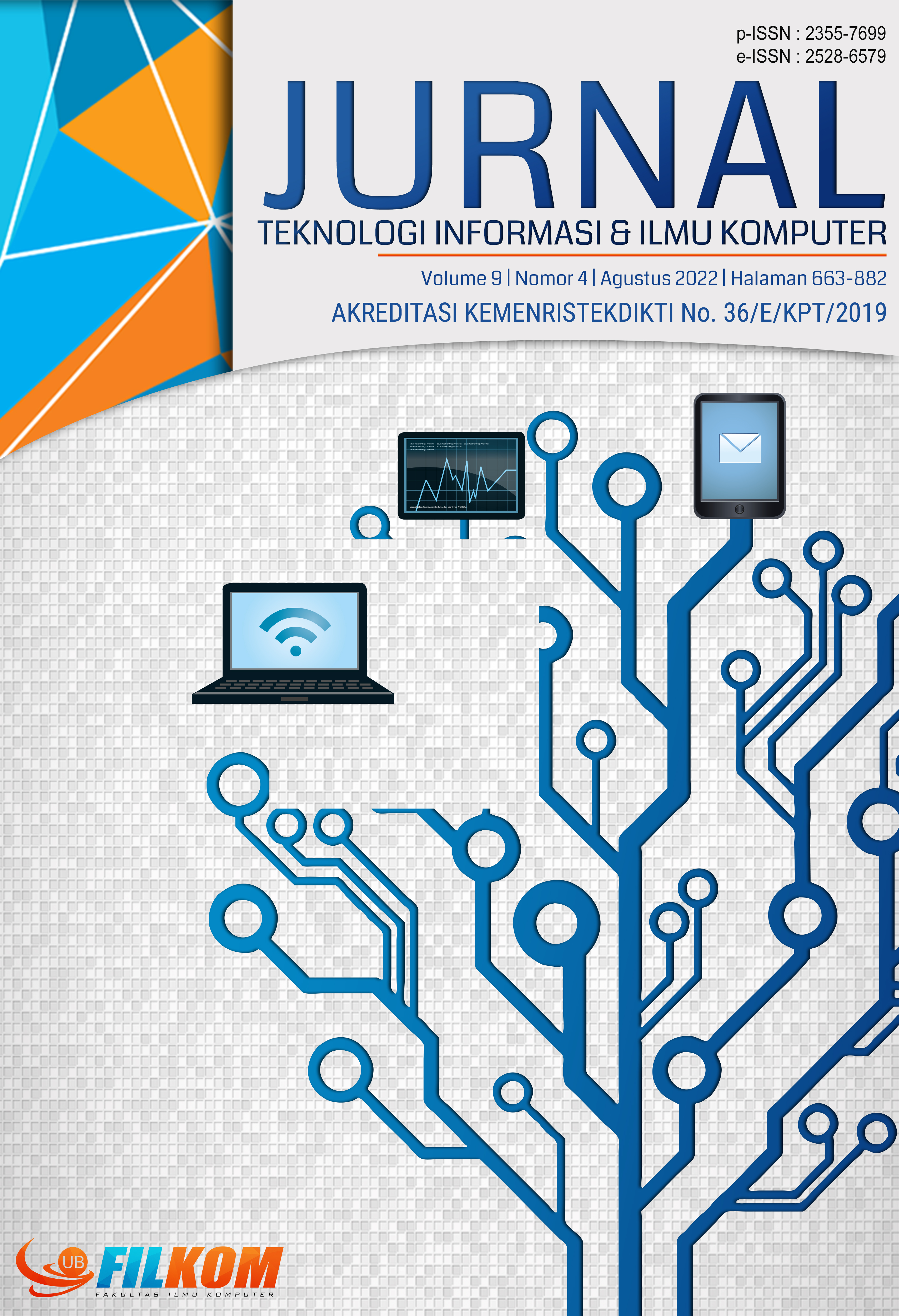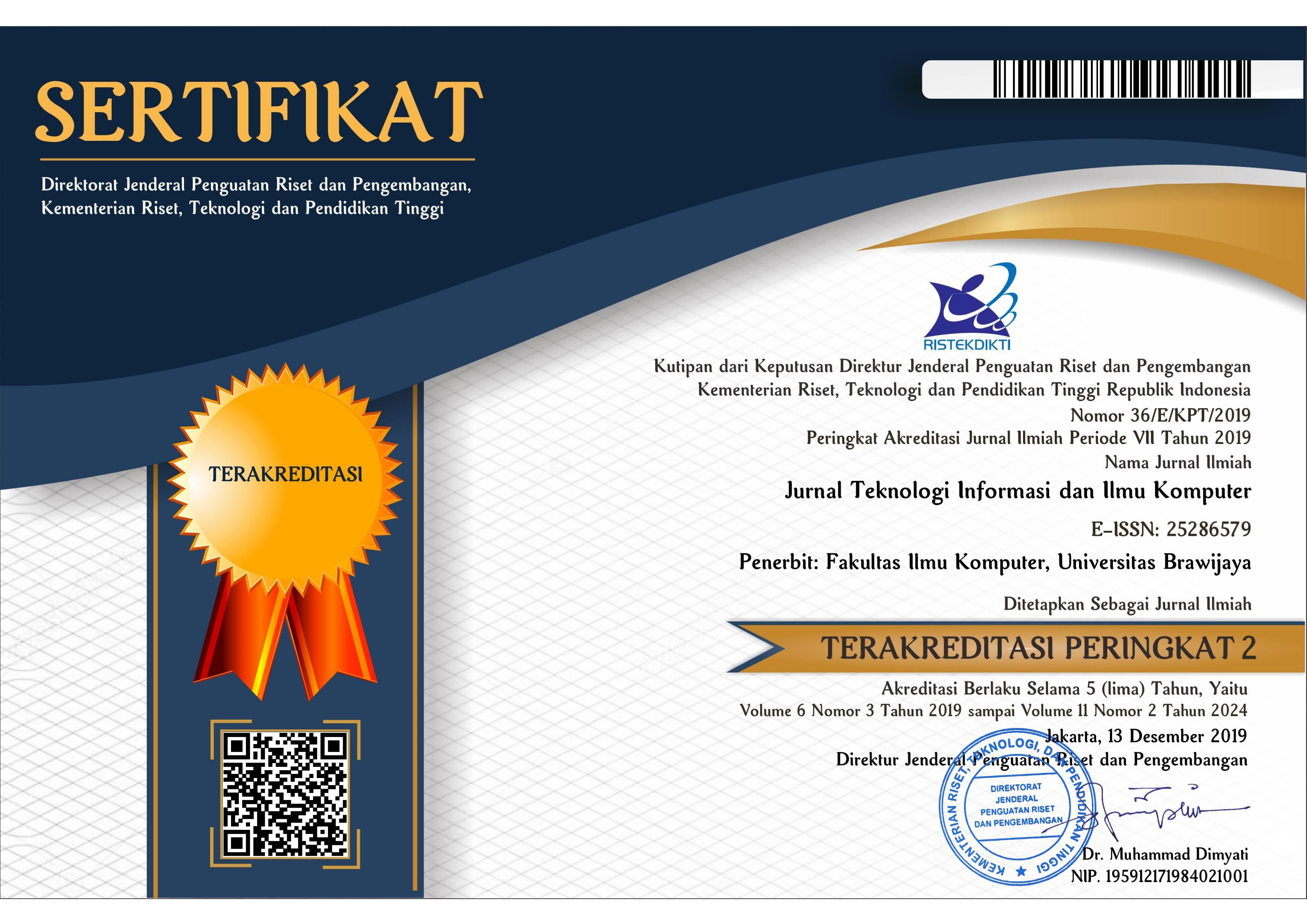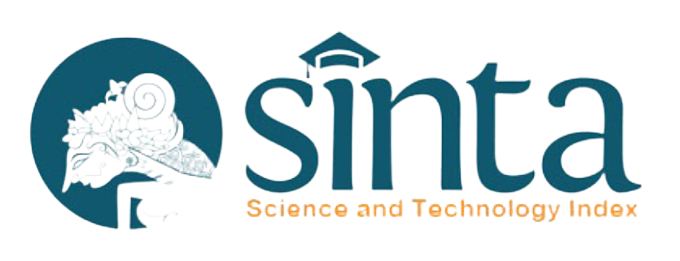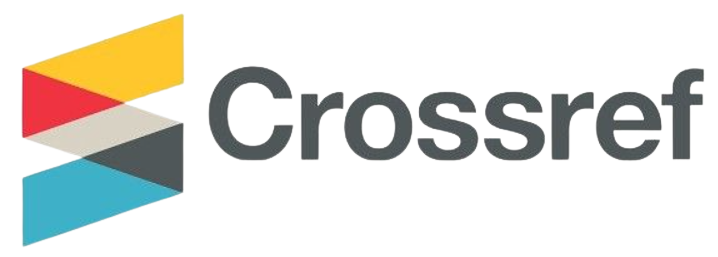Model Analisis Aktivitas Tutor Dalam Learning Management System Berdasarkan Data Log Menggunakan K-Means Dan Deteksi Outlier
DOI:
https://doi.org/10.25126/jtiik.2022934764Abstrak
Pembelajaran tutor di LMS menyimpan data berupa log yang dapat dimanfaatkan menjadi pengetahuan tentang kinerja tutor. Kinerja tutor yang lemah akan berdampak pada kinerja mahasiswa, dan kinerja institusi secara keseluruhan. Oleh karena itu, tujuan penelitian ini untuk (1) mendeskripsikan dan memantau kinerja tutor yang lemah pada aplikasi LMS berbasis moodle berdasarkan data log, (2) mendeteksi tutor yang termasuk dalam kategori outlier berdasarkan aktivitas yang dilakukan di LMS. Tahapan penelitian ini terdiri atas 4 tahap, yaitu melakukan pengambilan data log aktivitas tutor selama satu semester (n =25), melakukan analisis deskriptif, dan analisis clustering dengan k-means dan deteksi outlier. Hasil temuan penelitian ini menunjukkan bahwa sebagian besar tutor memanfaatkan LMS hanya untuk mengumpulkan tugas, menampilkan materi dan sedikit yang disertai dengan aktivitas-aktivitas lain seperti forum, diskusi, quiz dan lainnya. Tutor dalam menampilkan standar isi atau konten hanya memberikan instruksi pengumpulan tugas dan menampilkan materi dengan menyertakan link atau video dari sumber lain. Fakta lain menunjukkan bahwa tutor jarang memberikan feedback (umpan balik) baik secara narasi maupun penilaian ketika memberikan tugas sehingga totur dalam melakukan pembelajaran online belum memenuhi standar proses pada pembelajaran online. Oleh karena itu, sebagian besar tutor underperformed karena isi dan proses pembelajaran onlinenya belum sesuai standar.
Abstract
The Tutors’ learning in LMS stores data in logs which can be used as knowledge to find out about tutor performance. The tutors were weak performance have been an impact on student performance, and the performance of the institution as a whole. Therefore, this study aims to (1) describe and monitor the weak performance of tutors in the LMS application based on log data, (2) detect tutors who are included in the outlier category based on the activities in the LMS. The stages of this research were 4 stages, namely collected log data of tutors' activities for one semester (n = 25), conducted descriptive analysis, clustered analysis with K-means, and outlier detection. The results were most tutors used LMS only to collected assignments, presented material and a few were activities such as forums, discussions, quizzes and others. Tutors presented standard content was only provide instructions for submitted assignments and displayed material by including links or videos from other sources. Another fact showed who were tutors rarely provided feedback both in narrative and assessment when giving assignments so that the tutors in doing online learning has not met the standard process in online learning. Therefore, most of the tutors have underperformed because the content and learning process have not up to standard.
Downloads
Referensi
BARADWAJ, B. K. & PAL, S. 2011. Mining Educational Data to Analyze Students‟ Performance. IJACSA, 2, pp. 63–69. doi: 10.1177/039463200201500108.
BARAGASH, R. S. & AL-SAMARRAIE, H. 2018. Blended learning: Investigating the influence of engagement in multiple learning delivery modes on students performance. Telematics and Informatics, 35(7), pp. 2082–2098.
BARNEVELD, A. VAN, ARNOLD, K. E. & CAMPBELL, J. P. 2012. Analytics in higher education: Establishing a common language. EDUCAUSE Learning Initiative (ELI).
BRODSKY, A., SHAO, G., KRISHNAMOORTHY, M., NARAYANAN, A. & MENASCÉ, D. 2016. Analysis and optimization based on reusable knowledge base of process performance models. International Journal of Advanced Manufacturing Technology, 88(1–4), pp. 337–357. doi: 10.1007/s00170-016-8761-7.
CAVUS, N. & ZABADI, T. 2014. A comparison of open source learning management systems. Procedia-Social and Behavioral Sciences, 143, pp. 521–526.
CIGDEMOGLU, C., ARSLAN, H. O. & AKAY, H. 2011. A phenomenological study of instructors’ experiences on an open source learning management system. Procedia-Social and Behavioral Sciences, 28, pp. 790–795.
CORRALES, D. C., LEDEZMA, A. & CORRALES, J. C. 2018. From Theory to Practice : A Data Quality Framework for Classification Tasks Symmetry, 10, pp. 1–29. doi: 10.3390/sym10070248.
DEEPAK. 2017. Evaluation of moodle features at kajaani university of applied sciences–case study’, in Procedia computer science. Elsevier, pp. 121–128.
EMOND, B. & BUFFETT, S. 2015. Analyzing student inquiry data using process discovery and sequence classification. International Conference on Educational Data Mining. Canada, pp. 412–415.
GROSSMAN, R. L. & SIEGEL, K. P. 2014. Organizational models for big data and analytics. Journal of Organization Design, 3(1), pp. 20–25. doi: 10.7146/jod.9799.
HAGERTY, J. 2016. 2017 Planning Guide for Data and Analytics, Gartner. Available at: https://www.gartner.com/binaries/content/assets/events/keywords/catalyst/catus8/2017_planning_guide_for_data_analytics.pdf (Accessed: 10 October 2018).
HAN, J., PEI, J. & KAMBER, M. 2011. Data mining: concepts and techniques. Elsevier.
LEAL FILHO, W. ET AL. LEAL FW,. PALLANT, E. ENETE, A. dan RICHTER, B. 2018. Planning and implementing sustainability in higher education institutions: an overview of the difficulties and potentials. International Journal of Sustainable Development & World Ecology, 25(8), pp. 713–721.
LINUWIH, S. & MASHURI, M. 2010. Pendeteksian Outlier dan Penentuan Faktor-Faktor yang Mempengaruhi Produksi Gula dan Tetes Tebu dengan Metode Likelihood Displacement Statistic-Lagrange. Jurnal Teknik Industri, 12(2), pp. 95–100. doi: 10.9744/jti.12.2.pp.95-100.
MONALISA, S. 2018. Klasterisasi Customer Lifetime Value Dengan Model LRFM Menggunakan Algoritma K-Means. Jurnal Teknologi Informasi dan Ilmu Komputer (JTIIK), 5(2), pp. 247–252.
MUNOZ-GAMA, J. 2016 Conformance Checking and Diagnosis in Process Mining, Comparing Observed and Modeled Processes. 1st edn. Edited by W. M. P. Van Der Aalst et al. Chile: Springer. doi: 10.1007/978-3-319-49451-7.
OGUGUO, B.C.E., NANNIM, F.A., AGAH, J.J., UGWUANYI, C.S., & ENE, C.U., NZEADIBE, A.C. 2020. Effect of learning management system on Student’s performance in educational measurement and evaluation. Education and Information Technologies, pp. 1–13.
RAHADIAN, B.A.,KURNIANINGTYAS, D., MAHARDIKA, D.P., MAGHFIRA, T.N., & CHOLISSODIN, I. 2017. Analisis Judul Majalah Kawanku Menggunakan Clustering K-Means Dengan Konsep Simulasi Big Data Pada Hadoop Multi Node Cluster’, Jurnal Teknologi Informasi dan Ilmu Komputer (JTIIK) p-ISSN, 2355, p. 7699.
RAHIM, A. S., MASKUR, M. & WICAKSONO, G. W. (2020) ‘Implementasi Metode Feature-Oriented Software Development (Fosd) Dalam Mengembangkan Learning Management System (Lms)’, Jurnal Repositor, 2(12).
RODRÍGUEZ, A. I., RIAZA, B. G. & GÓMEZ, M. C. S. (2017) ‘Collaborative learning and mobile devices: An educational experience in Primary Education’, Computers in Human Behavior, 72, pp. 664–677.
ROMERO, C. ET AL. CEREZO, R., BONGARIN, A. SÁNCHEZ-SANTILLÁN, M. 2016. Educational process mining: A tutorial and case study using moodle data sets’, in ELATIA, S., IPPERCIEL, D., and ZAÏANE, O. R. (eds) Data Mining and Learning Analytics: Applications in Educational Research. Kanada: John Wiley & Sons Hoboken, NJ, pp. 3–28.
SHEN, X., FU, X. & ZHOU, C. 2018. A combined algorithm for cleaning abnormal data of wind turbine power curve based on change point grouping algorithm and quartile algorithm. IEEE Transactions on Sustainable Energy, 10(1), pp. 46–54.
SINULINGGA, A. & SIMATUPANG, N. 2018. The Difference Between Certified And Non Certified PE Teachers Performance Based On Range Of Service Period. 3rd Annual International Seminar on Transformative Education and Educational Leadership (AISTEEL 2018). Atlantis Press.
SUKAWATI., NADYA, N., GUNAWAN, I. UBAIDILLAH, E., MAULINA, SASI, S. & FIRMAN, B. 2020. Human Resources Management in Basic Education Schools. 2nd Early Childhood and Primary Childhood Education (ECPE 2020). Atlantis Press, pp. 292–299.
THERESIA, L., LAHUDDIN, A.H., RANTI, G. & BANGUN, R. 2018. The influence of culture, job satisfaction and motivation on the performance lecturer/employees. International Conference on Industrial Engineering and Operations Management. Bandung, pp. 2541–2552.
VILLEGAS, C.W.,LUJÁN, M.S.,BUENAÑO, F.D. & PALACIOS, P.X. 2018. Big data, the next step in the evolution of educational data analysis’, in International Conference on Information Technology & Systems. Springer, pp. 138–147.
VOGT, K. L. 2016. Measuring Student Engagement Using Learning Management Systems [disertasi]. ProQuest Dissertations and Theses. University of Toronto.
YUREK, I., BIRANT, D.& BIRANT, K. U. 2018. Interactive process miner : a new approach for process mining. Turk J Elec Eng & Comp Sci, 26, pp. 1314–1328. doi: 10.3906/elk-1708-112.
Unduhan
Diterbitkan
Terbitan
Bagian
Lisensi

Artikel ini berlisensi Creative Common Attribution-ShareAlike 4.0 International (CC BY-SA 4.0)
Penulis yang menerbitkan di jurnal ini menyetujui ketentuan berikut:
- Penulis menyimpan hak cipta dan memberikan jurnal hak penerbitan pertama naskah secara simultan dengan lisensi di bawah Creative Common Attribution-ShareAlike 4.0 International (CC BY-SA 4.0) yang mengizinkan orang lain untuk berbagi pekerjaan dengan sebuah pernyataan kepenulisan pekerjaan dan penerbitan awal di jurnal ini.
- Penulis bisa memasukkan ke dalam penyusunan kontraktual tambahan terpisah untuk distribusi non ekslusif versi kaya terbitan jurnal (contoh: mempostingnya ke repositori institusional atau menerbitkannya dalam sebuah buku), dengan pengakuan penerbitan awalnya di jurnal ini.
- Penulis diizinkan dan didorong untuk mem-posting karya mereka online (contoh: di repositori institusional atau di website mereka) sebelum dan selama proses penyerahan, karena dapat mengarahkan ke pertukaran produktif, seperti halnya sitiran yang lebih awal dan lebih hebat dari karya yang diterbitkan. (Lihat Efek Akses Terbuka).















